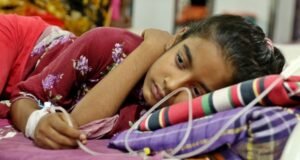
The gradual increase in dengue infection has created panic among the residents of Dhaka city.
Hospitals are failing to cope with the pressure of dengue patients despite setting up new wards. Patients are dying within just three days of getting admitted to hospitals.
A total of 89 people have died of dengue till October 15 this year. Doctors of Dhaka Shishu Hospital said that 119 children have been admitted with the disease in the first 12 days of this month. While visiting various hospitals in the city, UNB saw that people were lying on the floors due to a lack of hospital beds.
Doctors and health experts say that measures taken by the city corporations and other authorities are not proving to be effective. The publicity and drives carried out by the authorities to destroy larvae of Aedes mosquito, the carrier of the dengue virus, are appearing to be inadequate.
“Creating awareness among the public is a must to rein in the dengue menace. We’ve taken various steps in this regard,” Prof Dr Ahmedul Kabir, Additional Director General (Additional DG) of Directorate General of Health Services (DGHS), told UNB.
“Most of the casualties from dengue are happening outside Dhaka city. People aged between 40-50 years are the worst victim of this disease. It’s taking only three days for dengue patients to die from this disease,” Kabir added.
Public health expert Dr Mohammad Abdus Sabur Khan said that although dengue intensity usually decreases in September, but this time the situation has reversed.
“It’s October now, but dengue is showing no sign of retreating. It seems like dengue will prevail till mid-November this time,” Khan said.
Khan added that the under-construction buildings are the primary breeding grounds of Aedes mosquito.
“City corporations are conducting drives at people’s houses. But the construction sites are always covered by fences. As a result, the authorities can’t reach these places and thus the dengue menace goes on unabated,” added Khan.
Dr Nazmul Islam, Director of Disease Control Department of DGHS, described the activities that his institution was carrying out to prevent dengue.
“We do two things. Firstly, we prepare the hospitals for dengue treatment by keeping the doctors and the health care workers updated through training. Secondly, we conduct surveys in the two city corporations of Dhaka and submit the report to the local government authorities. According to our survey this year, the dengue epidemic has hit both the south and the north equally,” Nazmul said.
Nazmul added that dengue infection increases when the number of mosquitoes rises. He termed the current measures taken up by the authorities as a loss project as the breeding grounds of the Aedes mosquitoes still exist.
According to the DGHS, a total of 24,326 people have been affected with dengue till October 15 of this year, while the number was 28,429 in 2021.
The highest number of people infected by dengue was in 2019, when a staggering 1,01,354 people were infected with the virus.
The same goes for mortality caused by dengue. In 2019, a record 179 people had died of dengue, while the figure has been 89 to date this year.
Dr ABM Abdullah, an Emeritus Professor and the personal physician of Prime Minister Sheikh Hasina, provided some guidelines to fight dengue.
“First of all, if anyone is infected with dengue, he has to consult a doctor and start taking medicines according to the prescription. Some people tend to think that a mild fever won’t do any harm. This line of thinking must be discarded. People suffering from fever must test themselves, and if dengue is identified in someone, he has to be admitted in hospitals immediately,” Abdullah said.
Selim Reza, Chief Executive Officer (CEO) of Dhaka North City Corporation (DNCC), claimed that they’re conducting drives to weed out dengue from localities, although he couldn’t justify why they’re being unable to conduct drives at construction sites.
Farid Ahmed, Chief Executive Officer (CEO) of Dhaka South City Corporation (DSCC), said that they’ve fined numerous building owners for not cleaning stale water, the place where Aedes mosquitoes lay eggs.
“Mass awareness is necessary to fight Dengue. If the people are aware then Dengue won’t be able to do any harm,” Farid said.
 Weekly Bangla Mirror | Bangla Mirror, Bangladeshi news in UK, bangla mirror news
Weekly Bangla Mirror | Bangla Mirror, Bangladeshi news in UK, bangla mirror news







